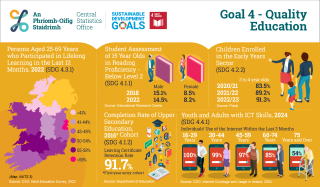Ireland's SDG Progress - Goal 4 Quality Education 2024

Ireland's had made a commitment to global sustainability by signing up the United Nations’ Sustainable Development Goals (SDGs). Among these, SDG 4: Quality Education stands as a cornerstone for creating equitable and inclusive societies. As part of its commitment to the SDGs, the Irish government has been tracking and reporting its progress and this recent update from the Central Statistics Office (CSO) assesses how well the country is faring in delivering quality education for all.
SDG 4
SDG 4 aims to ensure inclusive and equitable quality education and promote lifelong learning opportunities for all. Specifically, it includes targets such as:
- Ensuring all youth and a substantial proportion of adults achieve literacy and numeracy.
- Ensuring equal access to affordable technical, vocational, and tertiary education.
- Eliminating gender disparities in education and ensuring equal access to education for vulnerable groups.
For Ireland, achieving SDG 4 means ensuring that every individual, regardless of their background, gender, or socio-economic status, has access to quality education at all stages of life.
Key Highlights
-
In 2024, 65 per cent of those aged 25 to 34 held a third level qualification. This was 61 per cent for those aged for 35 to 44.
-
64 per cent, almost two-thirds of adults, aged 25 to 34 years took part in lifelong learning in 2022. This compares with one-third, 35 per cent, of people aged 55 to 69 in 2022.
-
The retention rate of pupils sitting the Junior Certificate was 97.6 per cent, for those who started secondary education in 2016 (2016 Cohort). The Leaving Certificate retention rate was 91.7 per cent.
-
Over 91 per cent of three- to four-year-olds were enrolled in the early years sector in 2022/23, up from 83.5% two years previously.
One of the most encouraging developments is Ireland’s high primary school completion rate, which consistently remains near 100 per cent. The report shows that Ireland has maintained strong enrolment rates at the primary level and can succeed in providing foundational education to its young population. A large proportion of young people then continue their education past the compulsory primary years with secondary school participation rates remaining high. Targeted efforts must continue to ensure that marginalised groups are also supported in continuing their education. Of note in the report is Ireland’s success in achieving gender parity in tertiary education. The country has seen an increasing number of women enrolling in third-level education, a key indicator of progress in eliminating gender disparities in education. This is particularly evident in fields like medicine and science, where women now make up nearly half of the student population.
Despite the continued focus on making education more inclusive, particularly for students with disabilities and those from disadvantaged backgrounds, with the expansion of special education services and an increase in tailored programs to support students with learning needs, there is still room for improvement in fully integrating all marginalised groups into mainstream education.
As part of the global shift toward digital learning, Ireland has invested in improving digital literacy among students. Digital tools are being incorporated at every level of education, from primary to tertiary. Furthermore, the report highlights Ireland’s focus on lifelong learning, with an emphasis on adult education and vocational training. The development of these skills is increasingly seen as essential in a rapidly changing job market.
A key theme emerging from the report is the integration of sustainability into Ireland's education system. Schools, colleges, and universities are being encouraged to embed sustainability and environmental awareness into their curricula. This not only helps young people understand global challenges but also equips them with the skills to contribute to sustainable development.

GIVING A VOICE TO THOSE
WHO DON’T HAVE A VOICE
When you support Social Justice Ireland, you are tackling the causes of problems.
Challenges and Areas for Improvement
While Ireland has made notable progress, challenges remain in certain areas:
-
Access to Education for Vulnerable Groups: Despite improvements, there are still disparities in access to education for students from lower socio-economic backgrounds, particularly in rural areas. The government needs to focus on bridging these gaps through policies aimed at increasing educational support and resources in disadvantaged regions.
-
Mental Health and Well-being: Another area of concern highlighted in the report is the growing need for mental health support in schools and tertiary institutions. As students face increasing academic pressures and social challenges, the mental health infrastructure within the education system needs to evolve to meet these needs.
-
Teacher Training and Development: In a rapidly changing world, continuous professional development for teachers is crucial. The report suggests that while Ireland has a strong education workforce, there is an ongoing need to invest in teacher training, especially in digital technologies and inclusive education practices.
-
Impact of Climate Change on Education: The effects of climate change are becoming an increasingly significant challenge. The report notes that extreme weather events and environmental disasters could disrupt education systems, particularly in vulnerable areas. Ireland’s education system must adapt to ensure continuity of learning in the face of these challenges.
Ireland’s progress toward SDG 4 is commendable, with significant achievements in access to education, gender parity, and inclusive learning. However, there is still work to be done to ensure that every individual, regardless of their background or circumstances, has access to the opportunities provided by quality education.
